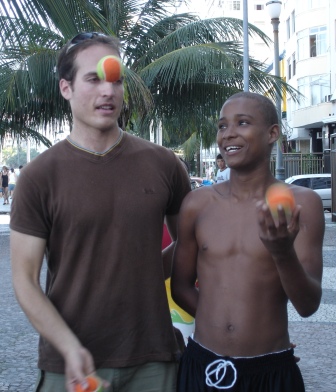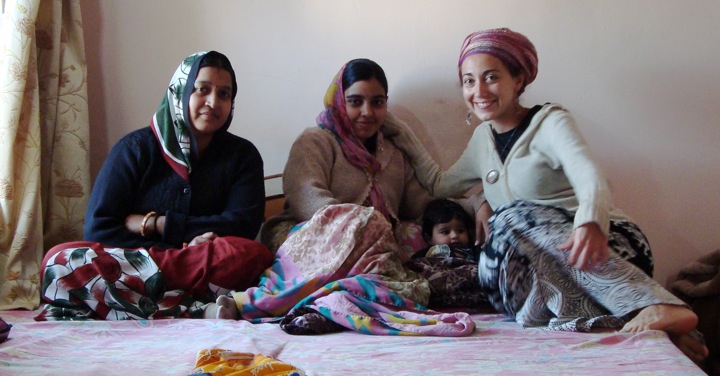
In Rio de Janeiro, Brazil, Rabbi Ben teaches a homeless Brazilian boy a new juggling trick. It was probably his first time meeting a Jew. Each Jew's behavior as a "public representative" of the Jewish people can change someone's opinion of Jews forever. That's why it's so important to learn from what Parsha Emor teaches about ideal behavior.
Much of this week’s parsha focuses on the requirements for the Kohanim, the priests. They have a lot of responsibilities and a lot of rules. But most of us aren’t priests (even many of those with the last name of “Cohen”) and even those who are don’t have a Temple to serve in anymore. So why on earth do we need to sit around and learn about them and all the little rules they have to follow?
The truth is that we are each a little bit of a Kohein. By studying the things they do, we start to see that our own rituals mimic theirs. The Kohanim, for example, wash their hands ritually… and we do the same thing, many times a day, starting with negelvasser in the morning when we wake up. Kohanim are told not to cut a gash in their skin (in mourning) – and we also are forbidden to do this (so instead we tear our clothes). The point of all these strange laws is that the Kohanim “should be holy to Hashem.” The rest of us, who don’t serve in the Temple, should also be holy to Hashem, in the best way we can, according to the opportunities we have.
The Kohanim have more stringencies partly because they’re such public figures. They have to set an example for the rest of the Jews. They also have all eyes on them, all of the time. Just as public figures in today’s world can’t afford to make a mistake, the priests of old could not.
In travel, we often become much more of a “public figure,” whether we like it or not. In India, I remember hundreds (literally hundreds!) of people taking our photos. When we walked in the streets, we stood out. All eyes on us! That’s when the advice to the Kohanim becomes the most important.
The way we act and talk in travel becomes the way that others perceive not only us – but all Jews. When you’re a public figure, you stand for more than just yourself. Just like the president has to try his best to make a good impression on the world so they will view the country favorably, the priests in Israel of old had to do the same. As do the Jewish travelers of today.
I’ve met a lot of people in my travels who have never met a Jew before. I’ve met others who’ve met Jews, but never really spoken to them or gotten to know them. I’ve spent time living and sharing space with Muslims, Hindus, and Christians; I’ve spent time living and sharing space with Latinos, Romanians, Germans, and Indians. In all of these situations, I think of myself as an ambassador. And, just like the example of the Kohanim in this week’s parsha teaches us, as I travel I try my best to hold myself to a higher standard… I try to act in a way that makes me holy, makes me holy by being the best example, messenger, and “public figure” I can possibly be.
Let’s all keep this in mind during our travels through life. Shabbat Shalom!

In Rajasthan, India I stayed with a Hindu family. They had never met a Jew before and were excited to learn about our culture and customs. Just like the Jewish priests are commanded to act in a "holy" way as public figures, each of us have our own opportunities to act "holy" and to represent the Jewish people as we travel.





